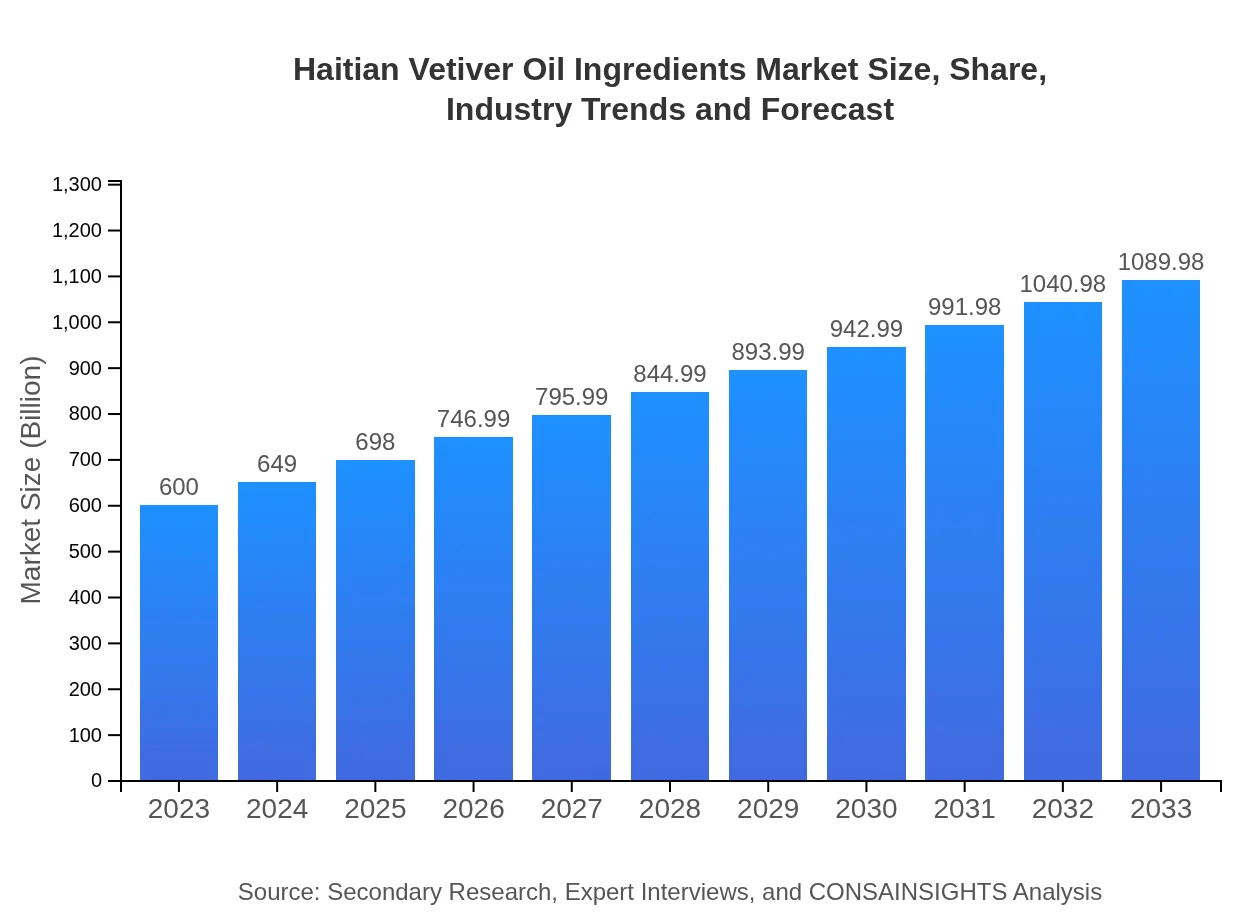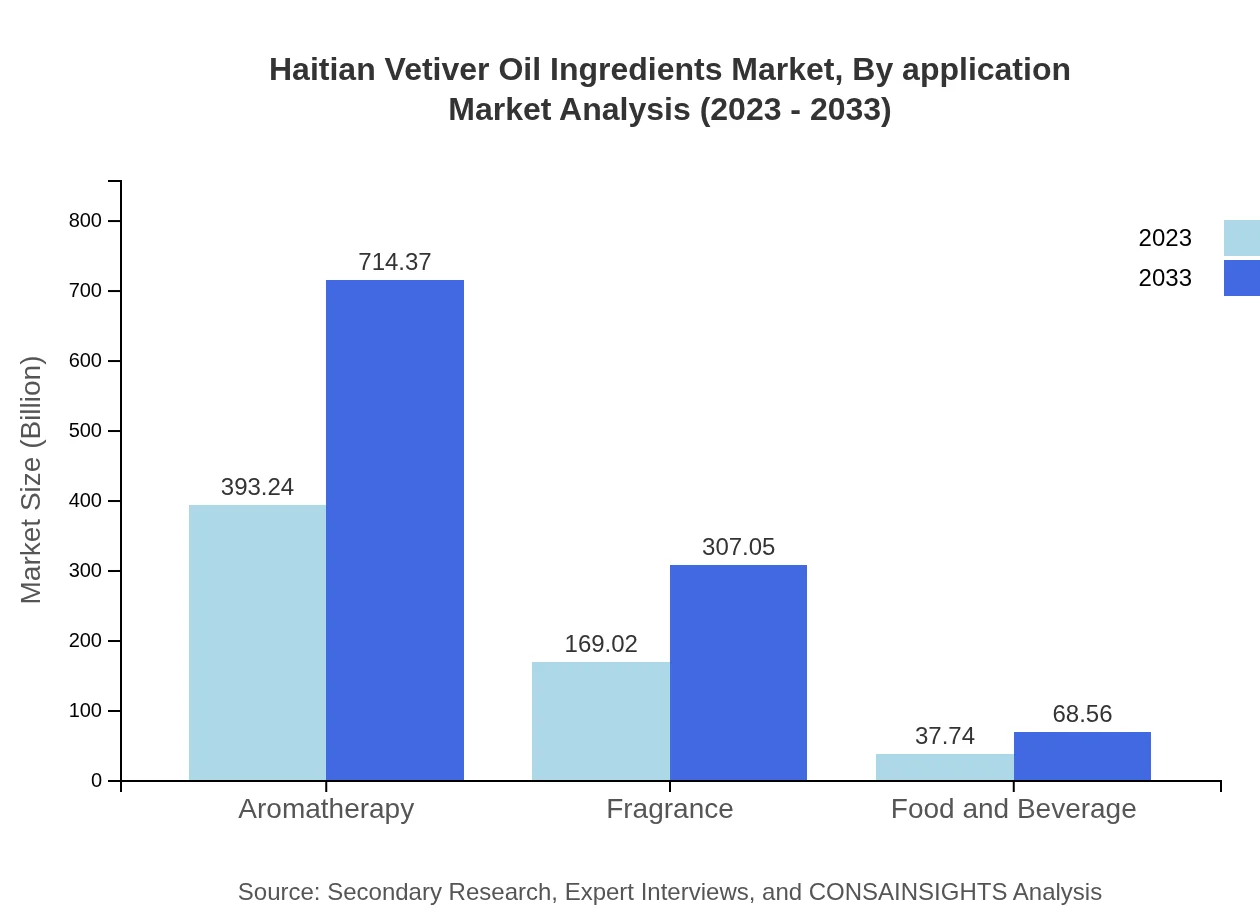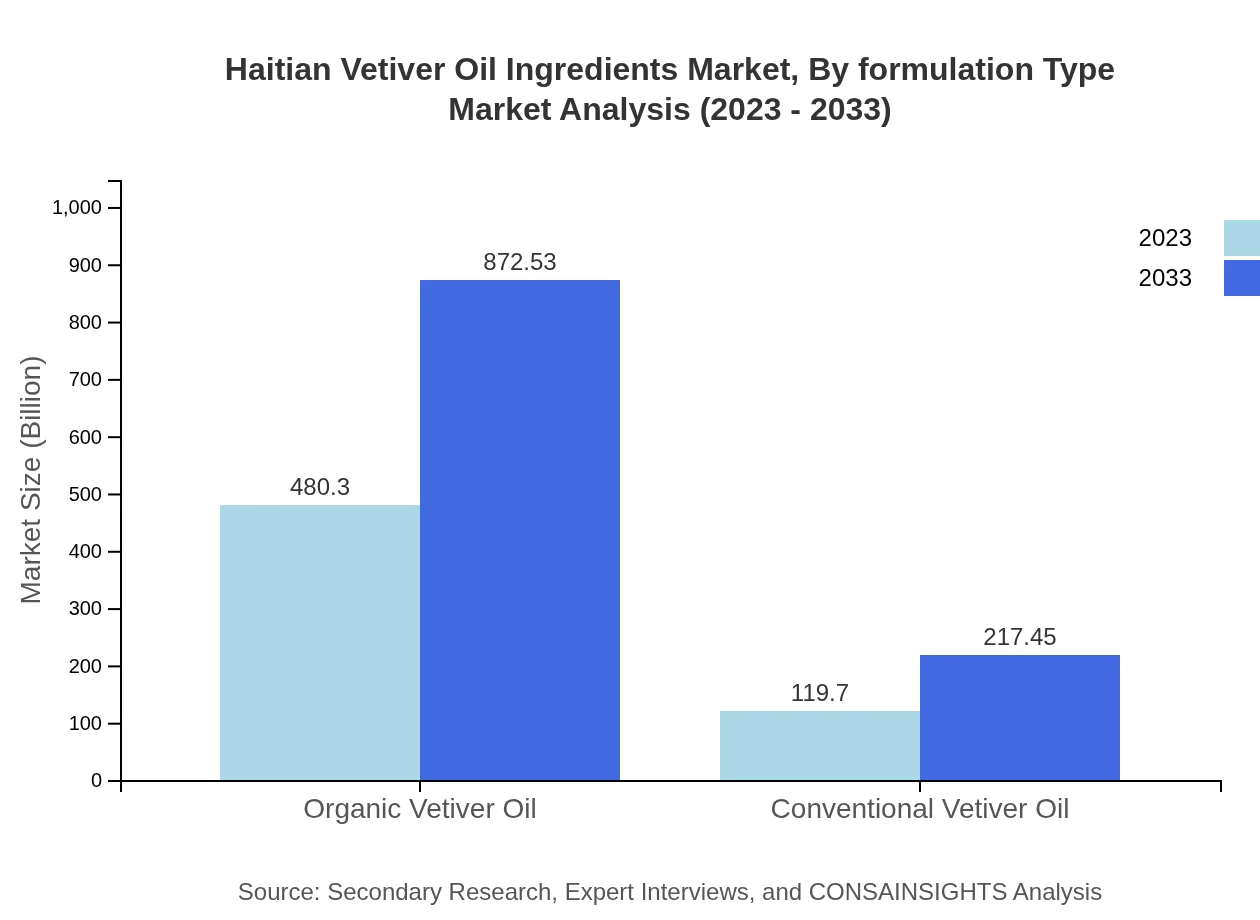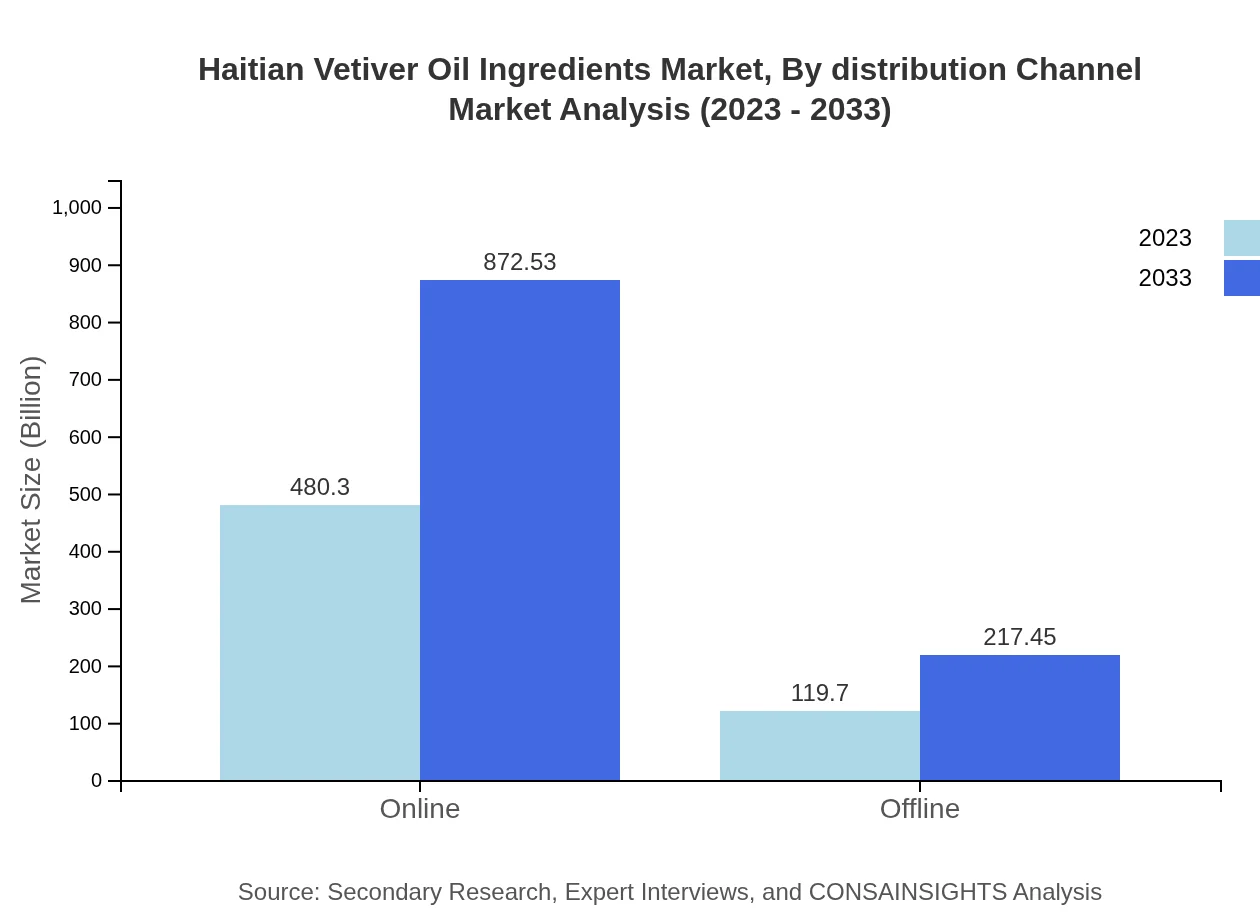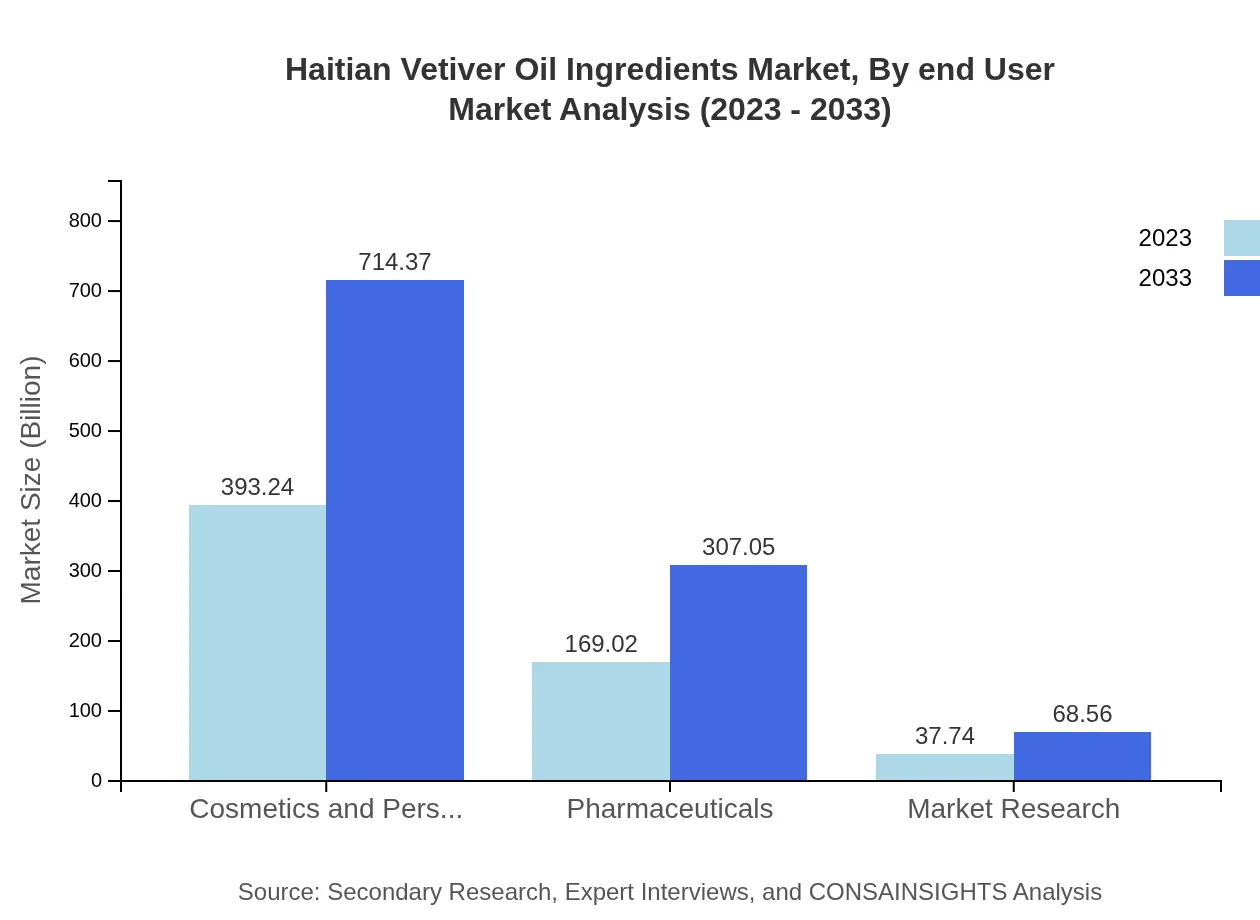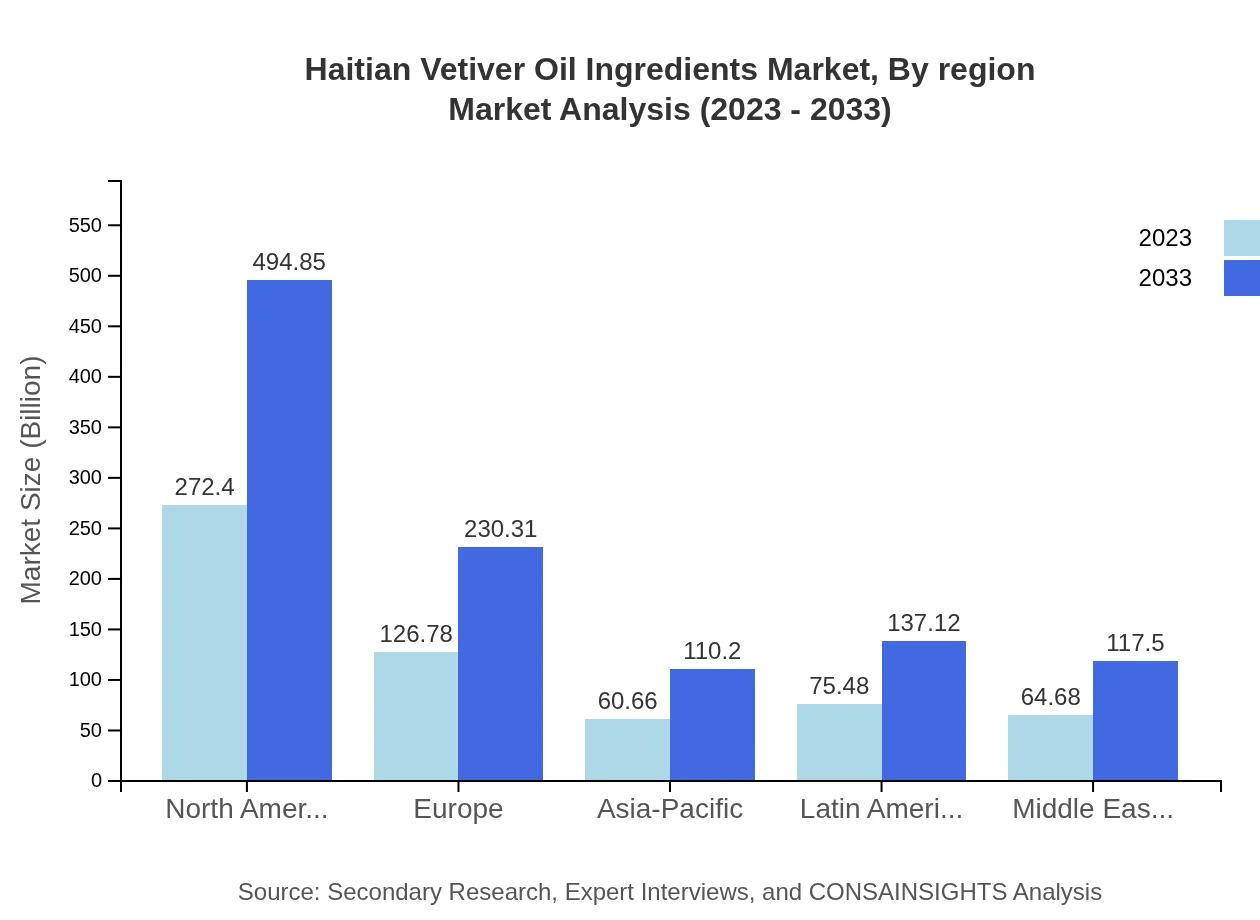Haitian Vetiver Oil Ingredients Market Report
Published Date: 31 January 2026 | Report Code: haitian-vetiver-oil-ingredients
Haitian Vetiver Oil Ingredients Market Size, Share, Industry Trends and Forecast to 2033
This report provides a comprehensive analysis of the Haitian Vetiver Oil Ingredients market, covering insights into market size, segmentation, regional dynamics, and industry projections for the period 2023 to 2033.
| Metric | Value |
|---|---|
| Study Period | 2023 - 2033 |
| 2023 Market Size | $600.00 Million |
| CAGR (2023-2033) | 6.0% |
| 2033 Market Size | $1089.98 Million |
| Top Companies | Givaudan, Symrise AG, Firmenich, International Flavors & Fragrances (IFF), Robertet |
| Last Modified Date | 31 January 2026 |
Haitian Vetiver Oil Ingredients Market Overview
Customize Haitian Vetiver Oil Ingredients Market Report market research report
- ✔ Get in-depth analysis of Haitian Vetiver Oil Ingredients market size, growth, and forecasts.
- ✔ Understand Haitian Vetiver Oil Ingredients's regional dynamics and industry-specific trends.
- ✔ Identify potential applications, end-user demand, and growth segments in Haitian Vetiver Oil Ingredients
What is the Market Size & CAGR of Haitian Vetiver Oil Ingredients market in 2023 and 2033?
Haitian Vetiver Oil Ingredients Industry Analysis
Haitian Vetiver Oil Ingredients Market Segmentation and Scope
Tell us your focus area and get a customized research report.
Haitian Vetiver Oil Ingredients Market Analysis Report by Region
Europe Haitian Vetiver Oil Ingredients Market Report:
Europe is witnessing robust growth, with the market size moving from $155.88 million in 2023 to $283.18 million by 2033. The European market is strongly influenced by regulations promoting organic labels and transparency in ingredient sourcing.Asia Pacific Haitian Vetiver Oil Ingredients Market Report:
In the Asia Pacific region, the Haitian Vetiver Oil market is valued at $114.12 million in 2023 and expected to grow to $207.31 million by 2033. Demand for natural oils in personal care and cosmetics is increasing, supported by cultural preferences for holistic and natural remedies.North America Haitian Vetiver Oil Ingredients Market Report:
North America dominates the market with a size of $232.32 million in 2023, projected to grow to $422.04 million by 2033. The region's strong preference for natural ingredients in cosmetics and pharmaceuticals makes it a pivotal market for Haitian Vetiver Oil.South America Haitian Vetiver Oil Ingredients Market Report:
In South America, the market is anticipated to expand from $30.54 million in 2023 to $55.48 million by 2033. The rising emphasis on organic products and sustainable sourcing practices is driving significant growth in this region.Middle East & Africa Haitian Vetiver Oil Ingredients Market Report:
In the Middle East and Africa, the market size is expected to rise from $67.14 million in 2023 to $121.97 million by 2033, driven by increasing demand for aromatic products and traditional medicines incorporating vetiver oil.Tell us your focus area and get a customized research report.
Haitian Vetiver Oil Ingredients Market Analysis By Application
The major applications for Haitian Vetiver Oil include cosmetics and personal care, pharmaceuticals, food and beverage, and aromatherapy. The cosmetics sector holds a substantial market share, driven by the oil's fragrance and therapeutic properties. Aromatherapy applications are also growing significantly, utilized for stress relief and relaxation.
Haitian Vetiver Oil Ingredients Market Analysis By Formulation Type
Haitian Vetiver oil is available in various formulations including organic and conventional types. Organic Vetiver oil appeals to health-conscious consumers in the growing organic market, while conventional types remain popular due to lower price points.
Haitian Vetiver Oil Ingredients Market Analysis By Distribution Channel
The market is segmented into online and offline channels. The online segment is expanding rapidly, accounting for a substantial share of the market due to the convenience offered to consumers. Offline retail remains significant, particularly in regions where local sourcing is emphasized.
Haitian Vetiver Oil Ingredients Market Analysis By End User
End-user industries include cosmetics, aromatherapy, pharmaceuticals, and food and beverage sectors. The cosmetics and personal care industry represents the largest segment, utilizing vetiver oil for its fragrance, skin benefits, and calming effects.
Haitian Vetiver Oil Ingredients Market Analysis By Region
Regional analysis highlights distinct differences in market performance influenced by consumer preferences, regulatory frameworks, and local ingredient sourcing practices. Each region's unique dynamics contribute to the overall growth trajectory of the Haitian Vetiver Oil market.
Haitian Vetiver Oil Ingredients Market Trends and Future Forecast
Tell us your focus area and get a customized research report.
Global Market Leaders and Top Companies in Haitian Vetiver Oil Ingredients Industry
Givaudan:
A global leader in fragrance and flavor, Givaudan is known for its innovative formulations and sustainable sourcing practices within the Haitian Vetiver Oil market.Symrise AG:
Symrise AG specializes in fragrances and is committed to responsible sourcing of vetiver oil. The company invests heavily in sustainable agriculture initiatives in Haiti.Firmenich:
As a top player in the fragrance industry, Firmenich is recognized for its quality vetiver oil products and significant efforts in community engagement and sustainability.International Flavors & Fragrances (IFF):
IFF focuses on innovative solutions in fragrance and flavor markets, sourcing high-quality vetiver oil responsibly to cater to both cosmetic and therapeutic applications.Robertet:
Robertet has established itself in the natural ingredient market, emphasizing organic vetiver oil products derived from eco-friendly practices in Haiti.We're grateful to work with incredible clients.









FAQs
What is the market size of Haitian Vetiver Oil Ingredients?
The Haitian Vetiver Oil Ingredients market is currently valued at approximately $600 million in 2023 and is projected to grow at a CAGR of 6.0%, indicating robust demand and an expanding market opportunity through 2033.
What are the key market players or companies in the Haitian Vetiver Oil Ingredients industry?
Key players in the Haitian Vetiver Oil industry include major essential oil manufacturers, fragrance houses, and suppliers involved in both organic and conventional vetiver oil markets, all competing in various segments of cosmetics, pharmaceuticals, and aromatherapy.
What are the primary factors driving the growth in the Haitian Vetiver Oil Ingredients industry?
Growth in the Haitian Vetiver Oil Ingredients market is primarily driven by increased demand in aromatherapy and cosmetics, as well as the rising trend for natural and organic products, boosting applications in personal care and health industries.
Which region is the fastest Growing in the Haitian Vetiver Oil Ingredients?
North America stands as the fastest-growing region, with a projected market size increase from $232.32 million in 2023 to $422.04 million by 2033, showcasing strong growth potential for Haitian vetiver oil applications.
Does ConsaInsights provide customized market report data for the Haitian Vetiver Oil Ingredients industry?
Yes, ConsaInsights offers customized market report data tailored to specific client needs within the Haitian Vetiver Oil Ingredients industry, ensuring that stakeholders receive relevant and actionable insights for strategic decisions.
What deliverables can I expect from this Haitian Vetiver Oil Ingredients market research project?
Expect comprehensive deliverables including detailed market analysis reports, forecasts, competitive landscape evaluations, and insights based on regional and segment data that highlight trends and growth opportunities within the industry.
What are the market trends of Haitian Vetiver Oil Ingredients?
Current trends in the Haitian Vetiver Oil Ingredients market include a growing preference for organic products, increased usage in personal care formulations, and a significant focus on sustainability and ethical sourcing initiatives among consumers and manufacturers.

